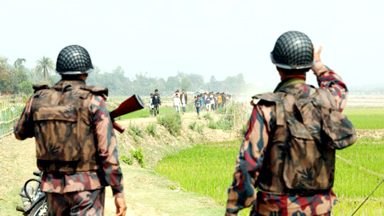DE Online Desk
At least 100 members of the Myanmar Border Guard Police (BGP) illegally crossed the Bangladesh-Myanmar border into Bangladesh on 4 and 5 February. Border Guard Bangladesh (BGB) disarmed them and detained them. In addition, the south-eastern region of Bangladesh is under continuous attack. Meanwhile, Myanmar forces are firing gunfire, mortar attacks. Attacking using gunships. Intense fighting between Myanmar government forces and the rebel Arakan Army in Rakhine and Chin states poses a serious security threat to Bangladesh. Historically, Bangladesh has a complicated relationship with Myanmar. Since 1978, ethnic Rohingyas have been repeatedly expelled from the northern part of Rakhine within the Bangladesh border. At the same time, the Myanmar army is violating the airspace as well as the land and sea borders of Bangladesh. Geographical location sometimes creates barriers between Dhaka and Napidor.
At least 1.3 million Rohingya refugees are staying in Bangladesh since August 2017.Myanmar is adamant in rejecting the repatriation of these refugees. It has strained the relationship between the two countries. A full-scale civil war between Myanmar’s military-controlled government and the exiled National Unity Government (NUG) began in May 2021. This has made the relationship between Bangladesh and Myanmar more complicated.
The Three Brotherhood Alliance was formed by the Arakan Army, the Myanmar National Democratic Alliance Army (MNDAA) and the Tang National Liberation Army (TNLA). On October 27, 2023, the Three Brotherhood Alliance and its allies launched a multi-pronged campaign against the Myanmar government. It was named Operation 1027. Since then, the ethnic insurgent Rakhine Arakan Army has waged a fierce war against the Myanmar army and BGP in Rakhine and Chin states. So far they have captured several towns like Paletoa and Pauktoa. Considerable territory has been taken over by them. Several battalions of the army have been captured. Almost all the border outposts along the Bangladesh-Myanmar border have expelled the members. A large amount of army equipment has been seized. The situation is so dire that the Myanmar government has been forced to impose a curfew in Sittwe, the capital of Rakhine State.
Escalating violence in Rakhine State has significantly reduced Bangladesh’s bilateral trade with Myanmar. Bangladesh has been facing serious challenges along the Myanmar border for weeks as fighting near the border intensified.
First, Bangladesh’s southwestern border areas, particularly Naikkongchari in Bandarban district, Teknaf and Ukhia in Cox’s Bazar, are becoming victims of shelling and mortar attacks in Myanmar’s ongoing war. Once there was an attack on the territory of Bangladesh from the helicopter gunship of Myanmar Air Force. Two Bangladeshi citizens were killed in these attacks. Many were injured. Many houses and vehicles were damaged. As a result, at least three thousand Bangladeshi citizens have moved from the border area to Naikkongchari. Additionally, schools have been closed. Movement of people and vehicles has been restricted.
Second, it appears that the Myanmar Army is implementing a ‘Four Cuts’ strategy to root out the insurgency in Rakhine State. At least 81 civilians were killed. Hundreds were injured. At least 120,000 people have been internally displaced. As a result, a humanitarian disaster has been created in that region. At the same time, a large influx of refugees may again come to Bangladesh. Meanwhile, two civilians from Rakhine State have come to Bangladesh and taken shelter. Continued violence in Rakhine state in particular could trigger a new wave of Rohingya refugees in Bangladesh. Bangladesh is already in serious crisis with the refugee crisis. At least 12 Rohingya civilians have been killed in Hopon Neo Liek village in Maungdoo, Rakhine, by the Myanmar army. Several dozen were injured. As a result, hundreds of thousands of Rohingyas have settled near the Bangladesh border. Apparently, their intention is to enter Bangladesh. At the same time, the intensification of the war in Myanmar has further stalled the Rohingya return process.
On the other hand, the preferred solution for Bangladesh is to repatriate these refugees to solve the crisis. The ongoing war in Rakhine state has provided the Myanmar government with an excuse to indefinitely suspend a pilot project for Rohingya repatriation. The NUG, on the other hand, has recently said that it is interested in the return of the Rohingyas only after the ouster of the military rulers from Napid. As a result, NUG has indirectly suspended the return of Rohingya.
Ultimately, the entry of Myanmar Army personnel into Bangladesh is a direct threat to Bangladesh’s sovereignty and security. Bangladesh has given them shelter for humanitarian reasons. But this trend will further destabilize the border between Bangladesh and Myanmar. It will create a serious security concern for Dhaka.
Myanmar is violating international law
According to Article 3 of the Protocol Addition to the Geneva Conventions of 1949, no state has the right to intervene directly or indirectly within another state in any conflict that is not of the international level. First of all, the civil war going on in Myanmar is not an international armed conflict. On its part, Bangladesh has maintained strict neutrality in the Myanmar war based on foreign policy. Bangladesh has not interfered in any way in any attack or indirect war going on inside Myanmar. Therefore, Bangladesh is following the international law with sincerity in Myanmar war.
On the other hand, Myanmar has been violating international law for years with near impunity. In 1978, 1991-1992 and 2017, the Myanmar government carried out brutal genocide against the ethnic Rohingya. This trend of genocide that has created the crisis in Bangladesh is a blatant violation of international law. And now in the latest incident, Myanmar is again violating international law in view of Bangladesh. Under Articles 2(4) and 51 of the UN Charter, UN member states must refrain from the use of force in international relations except in self-defense. In the meantime, Myanmar has attacked the Bangladesh border several times. Civilians of Bangladesh have been injured. Myanmar troops have illegally entered the border of Bangladesh. In addition, the Myanmar government has created such a dire situation in Rakhine state that Bangladesh may have to face a new influx of refugees from that region. Therefore, Myanmar’s behavior towards Bangladesh is illegal and unjust under international law.
Responsibility of the international community
The international community led by the UN Security Council has failed to control Myanmar’s “action”. Due to their own geopolitical and geo-economic interests, the Russia-Ukraine war and the Middle East war, the rest of the world has contributed very little to ending the ongoing war in Myanmar. It has done little to hold them accountable for these reasons. This inaction of the international community only contributes to the degradation of international law and international ideals.
However, growing instability within Myanmar and greater instability along the Bangladesh-Myanmar border could destabilize the entire region, including South and Southeast Asia. This war in Myanmar has already had a negative impact on Bangladesh and India. China and Thailand also had a minor impact. This incident threatens to transform into a wider regional crisis with serious implications for international security. Therefore, the international community must take necessary measures under the UN Charter to uphold international law and ensure regional and international security. The violence that is starting from Myanmar must be curbed.
— The Diplomat









